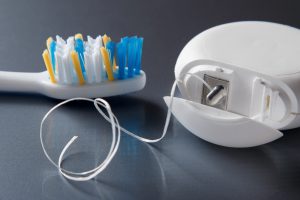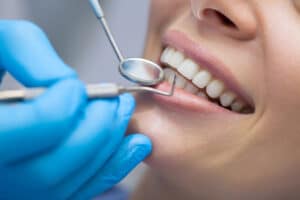Cavities and gum disease are common oral health problems that can arise after your teeth have been demineralized. Fortunately, you can take steps to repair your enamel and restore minerals that may have been lost on behalf of diet and other factors that contribute to demineralization.
Here are effective ways to remineralize your teeth, along with FAQs about this prevalent oral health condition.
Table of Contents
- Drink More Water
- Increase Saliva Production
- Brush and Floss Regularly
- Consume Less Sugar
- Eat Fresh Fruits & Vegetables
- Visit Your Dentist Regularly
- FAQs About Remineralizing Your Teeth
Water helps rinse away harmful bacteria, sugars, and acids in your mouth that may be eating away at tooth enamel and minerals. Water is also sugar-free and helps restore a healthy pH balance to your mouth. Make a point of increasing your water intake throughout the day and reduce your intake of coffee, tea, sodas, and sugary fruit juices that promote demineralization.
Increase Saliva Production
Like water, saliva naturally helps rinse away harmful bacteria that contributes to oral health problems including demineralization. Your saliva contains minerals such as calcium and phosphate that help replenish the amounts lost on behalf of diet and poor oral hygiene.
You can effectively increase saliva production in a number of ways, such as drinking more water, avoiding mouthwash products that contain alcohol, and quitting smoking. You can also stimulate saliva production by chewing sugar-free gum and eating healthy, crunchy snacks like carrots, celery, and nuts that take a long time to chew and break down.

Brush and Floss Regularly
Brushing your teeth at least twice per day and flossing regularly can reduce bacteria in your mouth to prevent cavities and mineral loss. According to a study in the International Journal of Nanomedicine, oral cavities are caused by a bacteria called Streptococcus mutans that is generally transmitted through foods and beverages. If your teeth have become demineralized, consider using a toothpaste brand formulated to remineralize teeth, or ask your dentist for toothpaste recommendations.
Consume Less Sugar
Sugary foods and drinks are strongly associated with an increased risk in the development and progression of cavities, according to a number of peer-reviewed medical journals including ISRN Dentistry. Eating sugar regularly even in small amounts can contribute to demineralization. Start consuming less sugar to remineralize your teeth, or cut sugar out of your diet completely. Read all labels on food packaging and drinks, and avoid sugar wherever possible to keep your teeth healthy.

Eat Fresh Fruits and Vegetables
Fruits and vegetables are loaded with vitamins and minerals that contribute to good oral health and pH balance, and are often high in water content to boost hydration. However, some fruits and vegetables can strip your teeth of enamel due to having high amounts of acid. Limit your intake of tomatoes and citrus fruits including grapefruits, oranges, and lemons, and brush your teeth immediately after eating these foods to avoid further demineralization. Choose fresh whole fruits over dried fruits, as the latter often contain high amounts of sugar and are more prone to sticking to your teeth.

Visit Your Dentist Regularly
If your teeth have been demineralized, visit your dentist as soon as possible or more frequently for routine cleanings, as your dentist can help you determine the root cause behind why enamel and minerals have been stripped away from your teeth. For instance, gum disease and dry mouth are conditions that can inhibit saliva production and contribute to demineralization. Your dentist can also give you pointers on how to remineralize your teeth based on your diet and other lifestyle factors.
FAQs About Remineralizing Teeth
Can you rebuild tooth enamel?
Enamel can be re-mineralized but it is not possible to rebuild missing enamel naturally. However, dental porcelain is a synthetic enamel replacement which has been proven to be successful at a replacing missing, stained or broken enamel..
How long does it take to remineralize your teeth?
The length of time it will take to remineralize your teeth depends on a number of factors, including the extent of damage done to your enamel and on the types of changes you must make to your diet to stop demineralization in its tracks. Your dentist can give you a more accurate estimate regarding how long it will take to remineralize your teeth based on your condition.
How can I tell if a tooth is dead?
A dead tooth may cause mild to severe pain in and around the affected tooth and gum line, or it may be asymptomatic and not hurt at all. Other signs and symptoms of a dead tooth include tooth discoloration, bad breath, a bad taste in the mouth, swelling around the tooth, and a pimple or abscess on the gum line near the tooth.
How do you remineralize enamel?
Enamel can be remineralized several different ways, mainly by making changes to your diet to exclude highly acidic and sugary foods, and by brushing your teeth with a remineralizing toothpaste. Your dentist can examine your teeth and suggest treatments and remedies that may work best for you.
How can I remineralize my teeth naturally?
You may be able to remineralize your teeth naturally by cutting sugar and acidic foods out of your diet, drinking more water, and taking steps to increase saliva production. However, these natural remedies may take several months or years, while professional dental treatment may significantly reduce your recovery time. According to the International Journal of Clinical Pediatric Dentistry, common dental treatments for remineralization include fluorides and non-fluoride remineralization agents such as xylitol and dicalcium phosphate dihydrate.
- Dental Implant Pros and Cons - August 26, 2023
- Receding Gums Stages - August 12, 2023
- When Is It Too Late for Gum Grafting? - July 8, 2023


